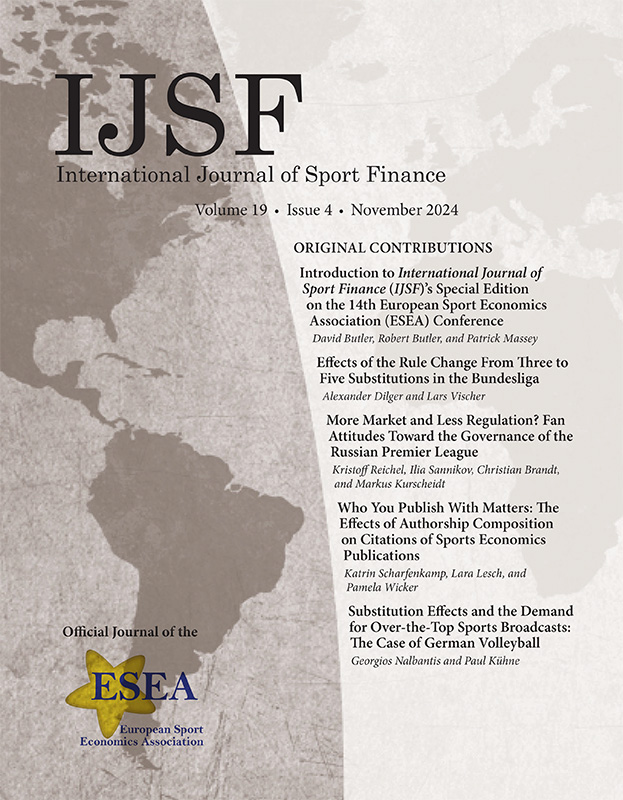
Articles
Introduction to International Journal of Sport Finance (IJSF)’s Special Edition on the 14th European Sport Economics Association (ESEA) Conference
The local organizers of the 14th ESEA Conference introduce the articles featured in this special issue of IJSF.
Effects of the Rule Change From Three to Five Substitutions in the Bundesliga
The COVID-19 pandemic has led to massive restrictions and changes in many different areas of life, including professional sports. In football, many games were cancelled and then, with the unchanged maximum of three time-outs, five substitutions were allowed instead of three—initially temporarily, now permanently. We analyze the impact of this rule change on coaches’ substitution decisions, comparing 836 games with three possible substitutions and 1,000 games with five possible substitutions in the six seasons from 2017/2018 to 2022/2023 of the Bundesliga (first division of German men’s football). In addition to team statistics, data on substitutions were collected. The results show that the rule change has changed the behavior of the coaches in terms of the number of substitutions made and the timing of substitutions. While using more of the allowed substitutions is good for the home team, the home bias is reduced by the rule change.
Keywords: Bundesliga, football, ghost games, rule change, substitution
More Market and Less Regulation? Fan Attitudes Toward the Governance of the Russian Premier League
Russian football is currently excluded from international competitions as a political sanction due to the military conflict. Despite this, matches in the national football leagues are continuing, and fans still attend professional football matches in the Russian Premier League (RPL). As fans’ attitudes toward aspects of Russian football governance are largely unexplored, the question arises how fans evaluate the governance of the Russian Premier League. Therefore, this article presents evidence from the first large survey of RPL supporters (N = 4,090) with a focus on consumer culture and requests for reforms of the RPL. The regression results reveal an attitudinal pattern toward the governance of the RPL in line with recent findings on Chinese football fans, which may be characterized as a post-socialist fan culture restricted by an authoritarian league governance. Hence, unlike European fans, Russian supporters associate more consumer sovereignty with commercialization because they mistrust the politicization of the RPL.
Keywords: Russia, football, soccer, supporters, governance, commercialization, consumer culture, stakeholder, post-socialist studies
Who You Publish With Matters: The Effects of Authorship Composition on Citations of Sports Economics Publications
The number of citations per publication is an established metric to evaluate scientists’ research impact. Therefore, it is important for scientists to learn how to potentially increase their publications’ citations. This study investigates whether and how the authorship composition regarding research impact, gender diversity, and cultural diversity affect citations of sports economics publications. Data of all sports economics publications in the International Journal of Sport Finance, Journal of Sports Economics, Contemporary Economic Policy, and Economic Inquiry (n = 926; 2006‒2020) and their corresponding citations were collected until January 2023. Results of log-linear regressions show an inverse U-shaped effect of the mean h-index and mean citations of coauthors on a publication’s citations. The higher the gender and cultural diversity among coauthors, the more citations per publication. These findings suggest that authorship team composition matters and increasing gender and cultural diversity among coauthors can benefit sports economics researchers’ citations.
Keywords: coauthors, cultural diversity, gender diversity, h-index, research impact
JEL Codes: Z20, I23, J16
Substitution Effects and the Demand for Over-the-Top Sports Broadcasts: The Case of German Volleyball
Despite the growing popularity of over-the-top (OTT) services and their advantages for non-mainstream sports, empirical research on the demand for OTT sports content remains limited. Our study addresses this gap, offering detailed insights into substitution effects and nuanced viewer preferences, with a focus on the German volleyball market. Econometric models reveal that, even with the rise of OTT services, fans still prefer watching games on traditional TV platforms when given the choice. The study uncovers intriguing dynamics in volleyball viewership, indicating that OTT viewers of women’s volleyball see men’s volleyball as close substitutes, while only men’s volleyball viewers are negatively affected by overlapping football games. These findings provide valuable guidance for stakeholders navigating the changing landscape of sports media rights and consumer behavior in the digital era.
Keywords: substitution, live streaming, demand, media, sports broadcasting, volleyball
JEL Codes: L83, D12, Z2

